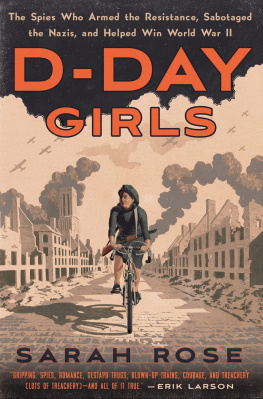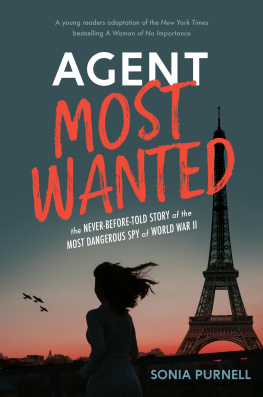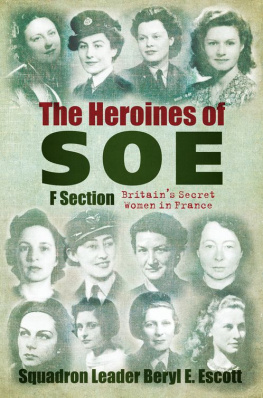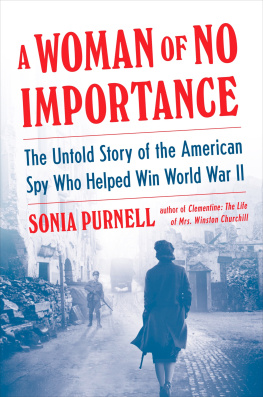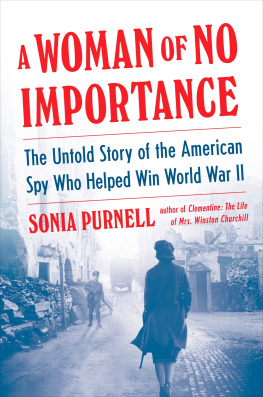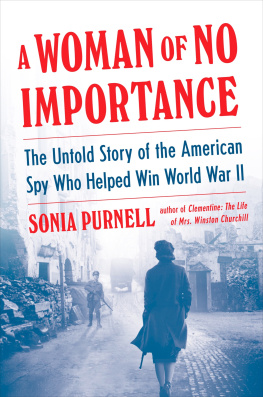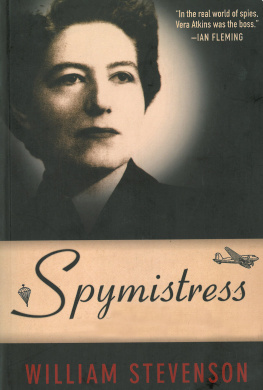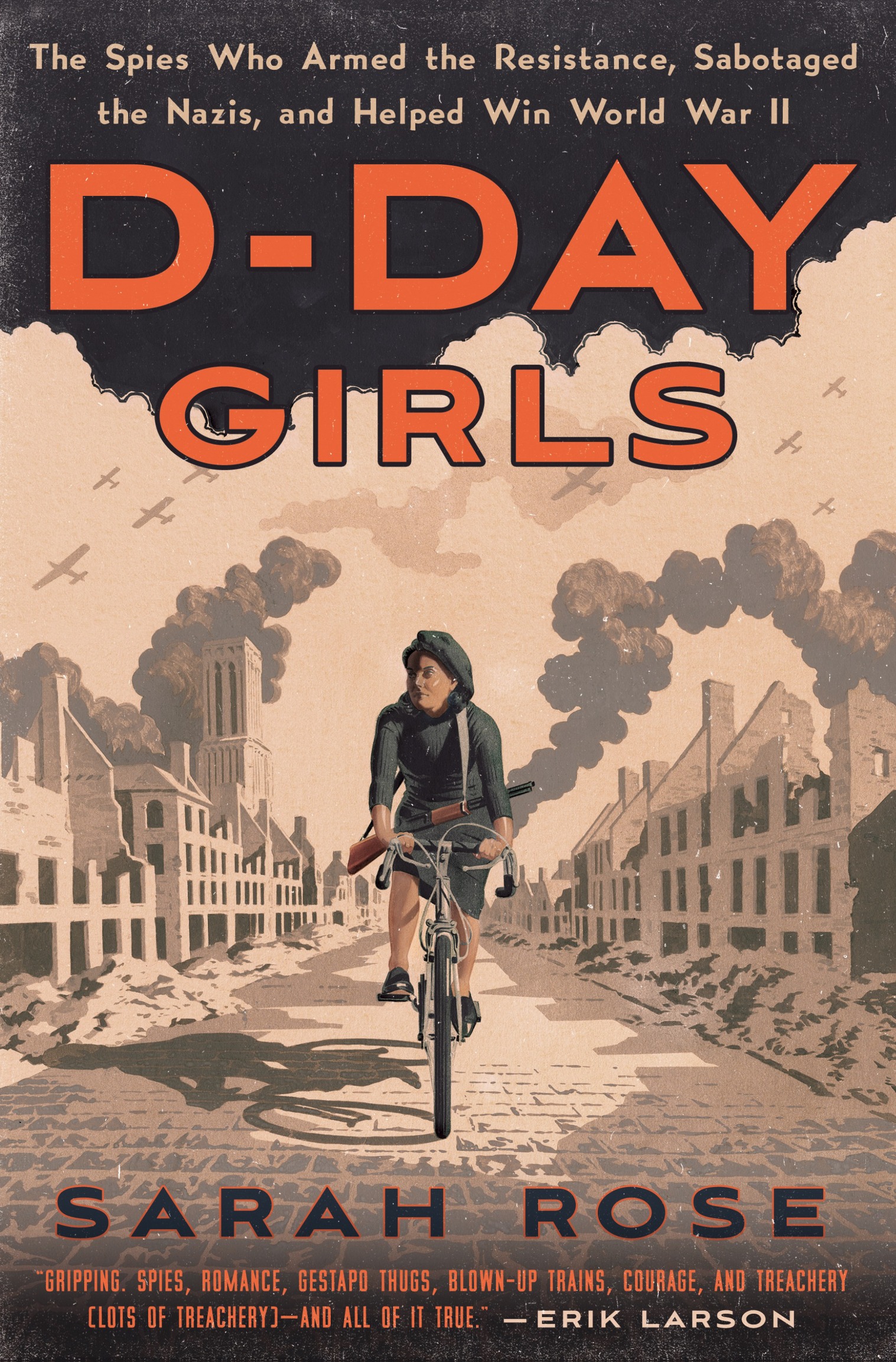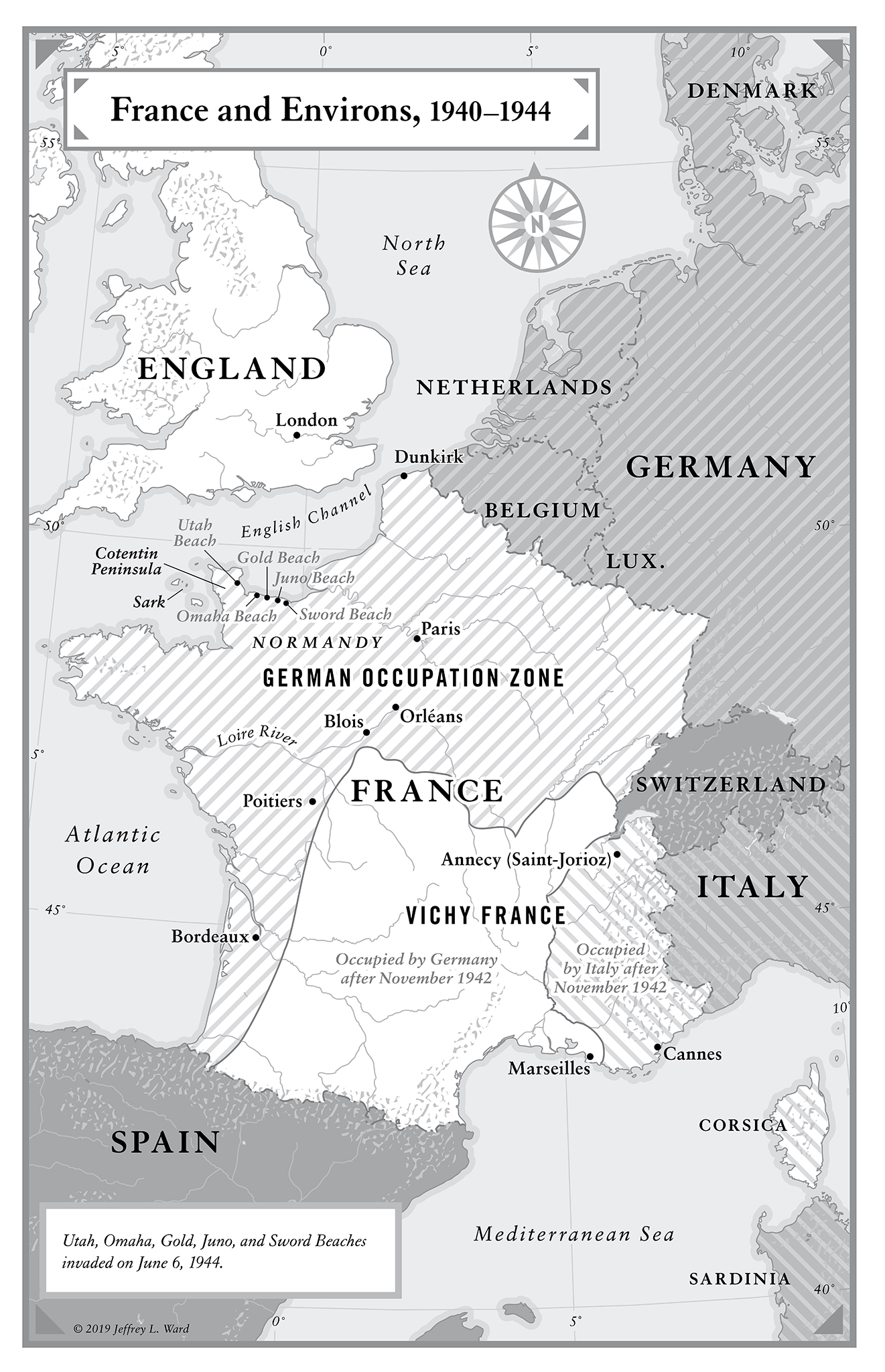Contents
Landmarks
Print Page List
Copyright 2019 by Sarah Rose
All rights reserved.
Published in the United States by Crown, an imprint of the Crown Publishing Group, a division of Penguin Random House LLC, New York.
crownpublishing.com
CROWN and the Crown colophon are registered trademarks of Penguin Random House LLC.
Library of Congress Cataloging-in-Publication Data
Names: Crown, Sarah Rose.
Title: D-Day girls : the untold story of the female spies who helped win World War Two / by Sarah Rose.
Other titles: D-Day girls, the untold story of the female spies who helped win WWII | Untold story of the female spies who helped win World War Two
Description: First edition. | New York : Crown, 2019 | Includes bibliographical references.
Identifiers: LCCN 2018038372 | ISBN 9780451495082 (hardcover) | ISBN 9780451495099 (pbk.)
Subjects: LCSH: World War, 19391945Secret serviceGreat Britain. | Women spiesGreat BritainHistory20th century. | Women spiesGreat BritainBiography. | Odette, 19121995. | Borrel, Andre, 19191944 | Baissac, Lise de, 19052004 | Espionage, BritishFranceHistory20th century. | World War, 19391945Underground movementsFrance. | World War, 19391945WomenGreat Britain.
Classification: LCC D810.S7 C766 2019 | DDC 940.54/864109252dc23
LC record available at https://lccn.loc.gov/2018038372
ISBN9780451495082
Ebook ISBN9780451495105
Map by Jeffrey L. Ward
Cover design by Elena Giavaldi
Cover illustration by Mark Stutzman
v5.4
ep
For Gerald Rose. He fought for Title IX.
Gloucester: Is Paris lost? Is Rouen yielded up?
If Henry were recalld to life again,
These news would cause him once more yield the ghost.
Exeter: How were they lost? What treachery was used?
Messenger: No treachery; but want of men and money.
William Shakespeare, Henry VI, Part 1, act 1, scene 1
Tout simplement, mon colonel, parce que les hommes les avaient laiss tomber.
I took up arms, quite simply, Colonel, because the men had dropped them.
Marguerite Gonnet, at trial, 1942
Contents
Character Chart
Andre Borrel
FIELD NAME: Denise
OPERATIONAL NAME: Whitebeam
COVER IDENTITY: Monique Urbain
Lise de Baissac
FIELD NAME: Odile
OPERATIONAL NAME: Artist
COVER IDENTITIES: Irne Brise, Jeanette Bouville
Odette Sansom
FIELD NAME: Lise
OPERATIONAL NAME: Clothier
COVER IDENTITY: Odette Metayer
Yvonne Rudellat
FIELD NAME: Suzanne
OPERATIONAL NAME: Soaptree
COVER IDENTITIES: Jacqueline Viallet, Jacqueline Gauthier, Jacqueline Culioli
Mary Herbert
FIELD NAME: Claudine
OPERATIONAL NAME: Corvette
COVER IDENTITY: Marie Louise Vernier
Francis Suttill
FIELD NAME: Prosper
OPERATIONAL NAME: Physician
COVER IDENTITY: Franois Desprez
Gilbert Norman
FIELD NAME: Archambaud
OPERATIONAL NAME: Butcher
COVER IDENTITY: Gilbert Aubin
Peter Churchill
FIELD NAMES: Michel, Raoul
OPERATIONAL NAME: Spindle
COVER IDENTITIES: Pierre Marc Chauvet, Pierre Chambrun
Claude de Baissac
FIELD NAME: David
OPERATIONAL NAME: Scientist
COVER IDENTITIES: Clement Bastable, Michel Rouault, Claude Marc Boucher
Part I
CHAPTER 1
God Help Us
London
Under the eternal gaze of Admiral Lord Nelson, high on a stone column in the center of London, Mrs. Odette Sansom raced toward her appointment at the War Office. The one-eyed, one-armed hero of Trafalgar got pelted in the rain, a bronze memorial to the glory that was Pax Britannica, many bloody conflicts removed from the London of July 10, 1942.
It was the 1,043rd day of the worlds worst war.
Much of the city lay in ruins, a ragged collection of gaps and edifices, like a childs mouth after a lost tooth. Odette tilted her hat against the unremitting damp and sprinted past the admirals brass lions as if spirit alone could somehow put London to rights, so that it might smile again.
Upon meeting Odette, Londoners were confronted with her Gallic lan, her essential Frenchness. She was self-consciously prettier than her English peers: big chestnut eyes, a fresh complexion framed by dark hair that was pulled high off her heart-shaped face and hung loose down her neck. Her light coat was cinched with a belt, the only burst of color in an otherwise bland London rain-scape; the city was full of uniformssoldiers, sailors, airmen. The entire world had gone drab. Although she had lived in England for much of her adult life, Odette never shed her Continental air, nor did she care to; frosty Britain seemed indifferent to sex and to women. With an inextinguishable flair for the theatrical, Odette preened and men in khaki swooned. It was said she even smiled in French.
The Victoria Hotel was a grande dame on mothballs, requisitioned for war work as the administrative home of the War Office. There were no bellhops to greet Odette; the twinkling chandeliers were packed off to safe storage; the building was dingy and practical like everything else. There were no dandies sharing cigarettes in the pink marble lobby; it was still busy, but with clerks and sergeants, men in mufti held back from the front, the old, the broken, those unsuited for battle, those too useful to be sacrificed. Someone had to run the war.
Odette arrived on account of a typed invitationher second from the War Office:
Dear Madam,
Your name has been passed to me with the suggestion that you have qualifications and information which may be of value in a phase of the war effort.
If you are available for interview, I should be glad to see you at the above address at 1100 hrs on Friday 10th July.
Would you let me know whether you can come or not?
Yours truly,
Selwyn Jepson
Captain
For an unhappily married woman in the third year of the war, the letter on government stationery was rife with potential. At a minimum, Odettes appointment afforded a precious afternoon alone; there was a new film opening in Leicester Square, Mrs. Miniver, the story of how English housewives contribute to the war by coping, how matriarchs move mountains while men are at the front. There was window-shopping to do, though, as elsewhere in Europe, very little could be bought under rations on a husbands service pay. At best, the letter might rearrange Odettes life a little, for what qualifications and information could the army need but her native French-language skills? Perhaps the War Office sought translators. Or secretaries. She was not too old to type at speed, or she could write letters to prisoners of war in France. That would be a very worthy service.
Odette did not know what would be asked of her, and the captains note gave away little. If the War Office had something practical in mind, she was determined to be useful.

